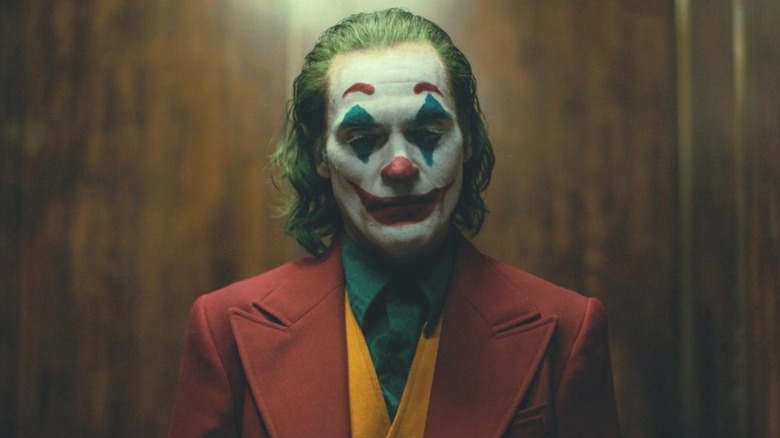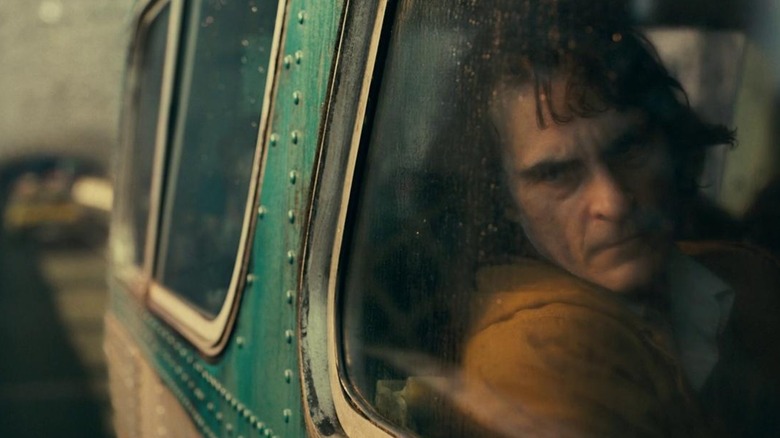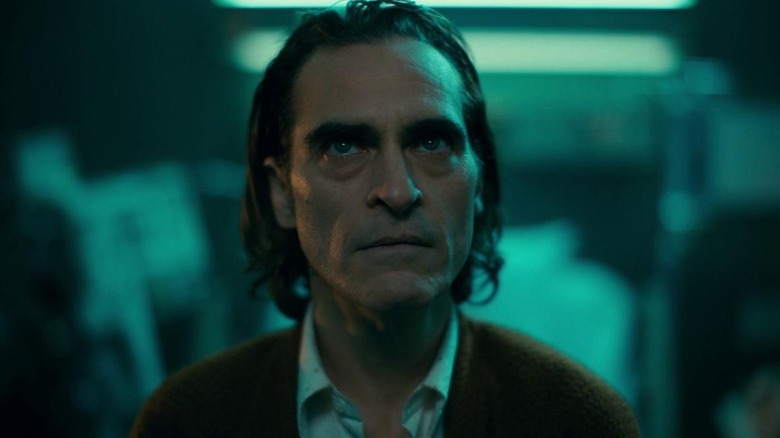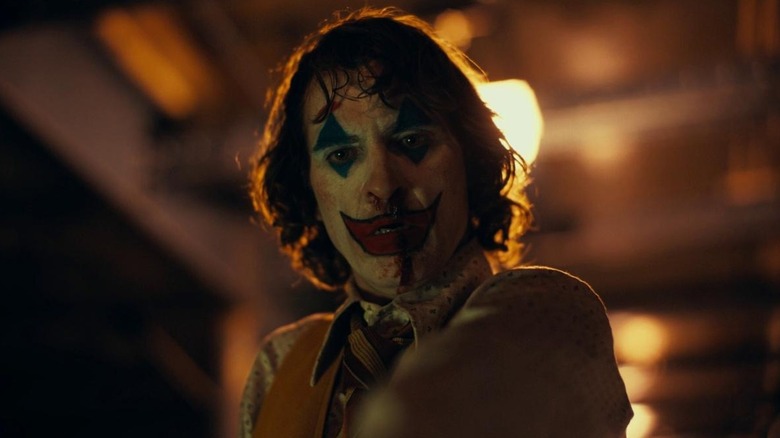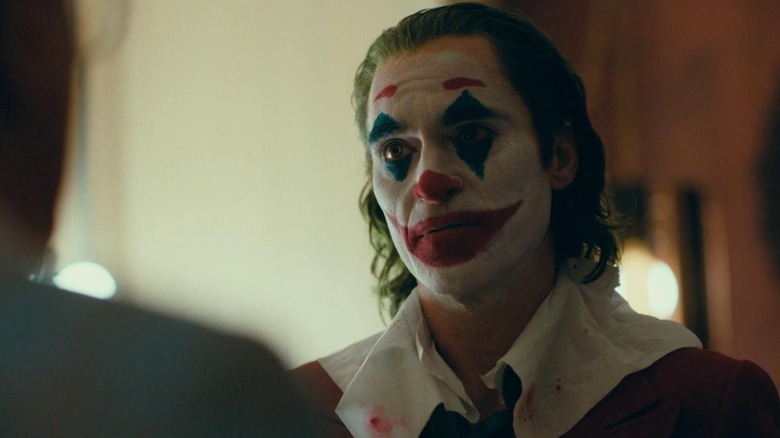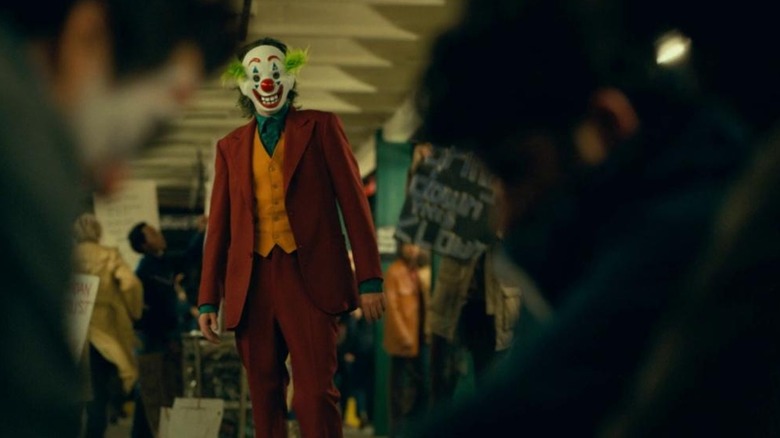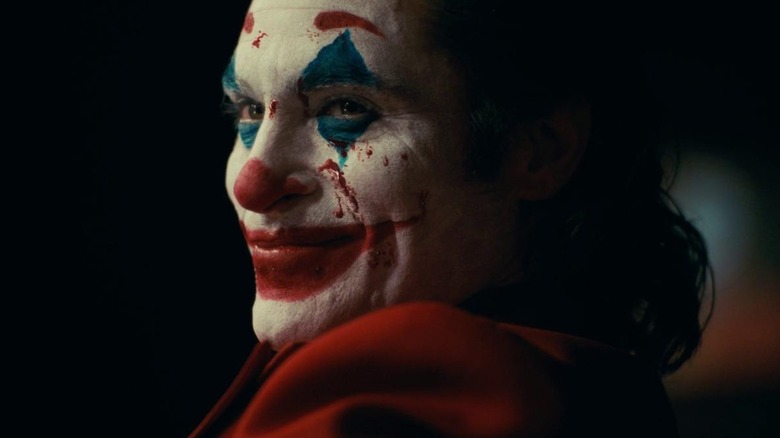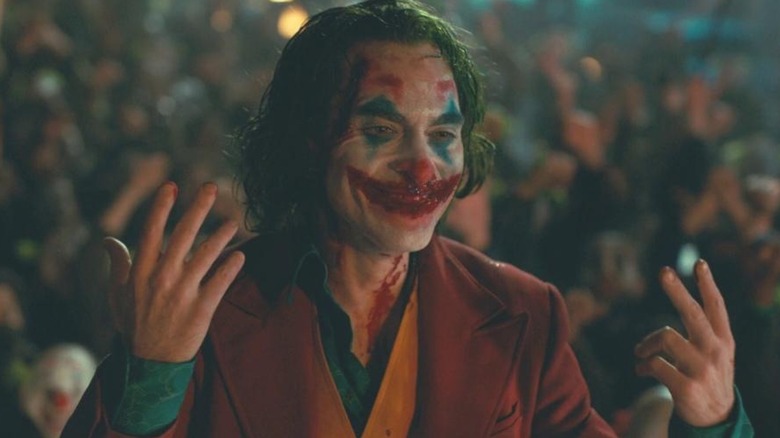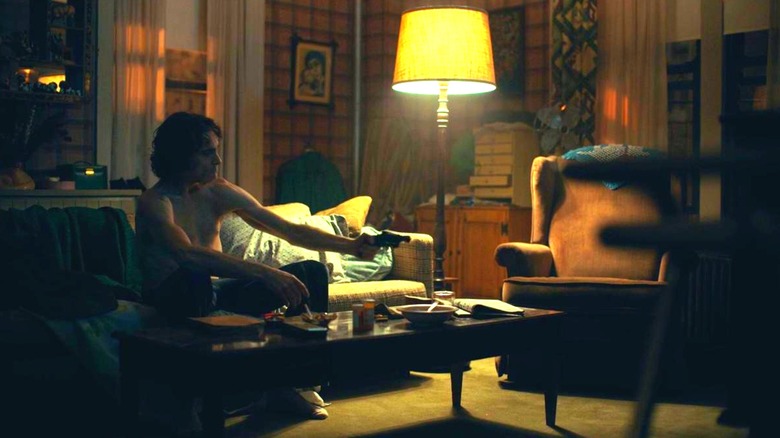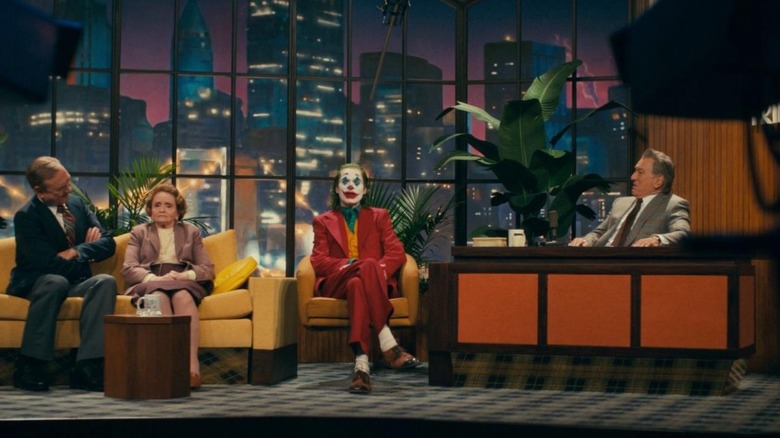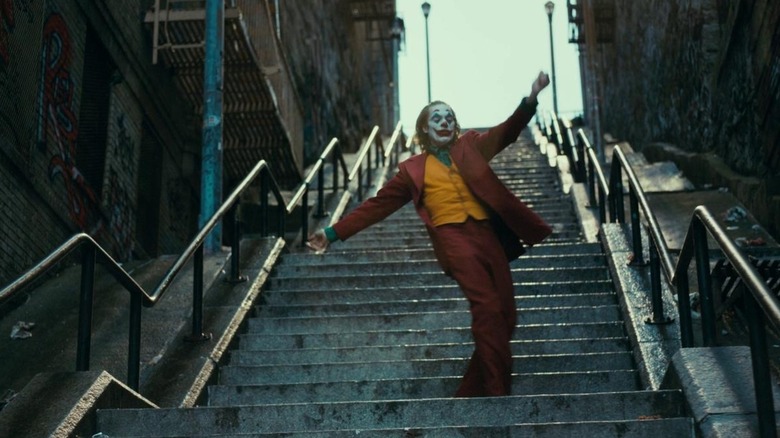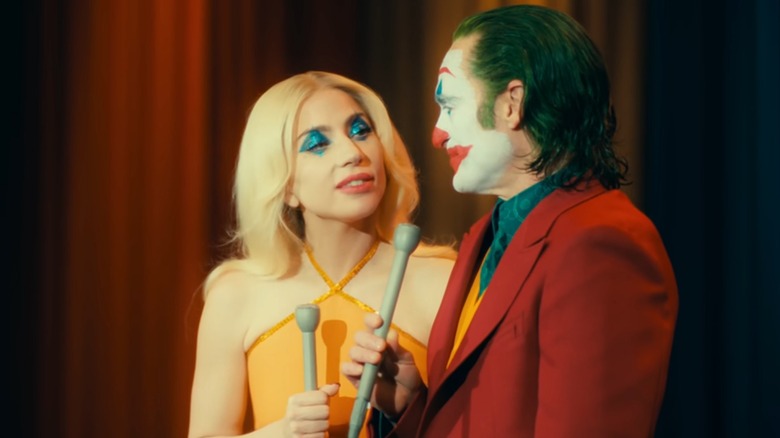How Joaquin Phoenix Transformed Into The Joker
Joaquin Phoenix is constantly on the lookout for roles that will push him as an actor. From "The Village" to "Inherent Vice," Phoenix's career has been full of highs and lows, but the one thing that never changes is the actor's passion for his craft. He's never seemed like the kind of actor who would be in a comic book movie, but then he showed up in Todd Phillips' "Joker" and completely changed the way we understand the most iconic comic book villain of all time.
In case anyone thought his first outing as Arthur Fleck was a fluke, "Joker: Folie À Deux" has proven that he really does have the ability to just sink back into the role. By the time he started working on the sequel, Phoenix had already discovered some strange ways to prepare to play the Joker, so he was just looking for another chance to push himself. In the sequel, Phoenix might well have perfected the character, but he didn't do it alone. It took the collaboration of makeup artists, clothing designers, and outside creative input for Phoenix to completely transform himself into the character we know as the Clown Prince of Crime.
Phoenix developed the character with Todd Phillips
Joaquin Phoenix began the process of transforming into the Joker long before he ever stepped onto the set or inside a makeup trailer. In some ways, Phoenix's transformation began even before he knew about the movie, because writer-director Todd Phillips always intended for him to play the role. Phillips has said that he wrote "Joker" with Phoenix specifically in mind, but Phillips took that aspect of the creative process even further by inviting Phoenix to help shape the character with him.
Part of the way that Phillips convinced Phoenix to push past his hesitancy about being in a comic book movie was to offer him a huge amount of control over the character. Long before filming began, Phoenix and Phillips would meet up to discuss "Joker" the film and the character himself. The two met up repeatedly, and Phillips would question Phoenix about Arthur Fleck's past and psychology while the two of them slowly worked out what made their protagonist tick.
That kind of collaboration didn't stop once the cameras started rolling. Phoenix would frequently go off script in certain scenes, and he and Phillips would spitball new ideas for scenes and shots in between takes. "It became so normal to us making the movie the way we made it that now that l'm doing press and looking back, I realize how unique it was," Phoenix told IndieWire about the process. "I've never had an experience quite like that."
He studied extensively for the role
The mental preparation that Joaquin Phoenix put into becoming the Joker went well beyond investigating every nook and cranny of Todd Phillips' script. Phoenix needed to understand Arthur Fleck's past, present, and internal world, but he also wanted to get something of an outside perspective on the character. To do that, he had to go into research mode and hit the books.
"Joker" highlights Arthur's laughing disorder, but it stays pretty vague on what's actually happening in the character's head. Phoenix decided to research everything from narcissists to the study of criminology, but even he decided to keep some of that work secret. When asked about the research he did for the movie, Phoenix half-jokingly told The New York Times, "I'm not going to tell you what those books were."
Though "Joker" isn't exactly an action movie, Phoenix did need to make sure that he was prepared for the physical aspects of the role. He worked with dancers and choreographers to master Arthur's movements, but he also turned to classic films for inspiration. Actors like Buster Keaton and Ray Bolger — two performers that the character Arthur might have actually admired — informed Phoenix's performance in the movie.
The look was heavily researched
In the movie, Arthur Fleck applies his own clown makeup, and that look shifts as he progresses from being a lonely down-and-out Gothamite to becoming a violent revolutionary. Arthur may be an amateur face painter, but the reason his Joker look is so iconic is because real-life makeup artist Nicki Ledermann was working behind the scenes. Ledermann put a ton of research and forethought into planning out the evolution of Arthur's clown look.
"I think by now I have all the books there are about clowns," Ledermann told Elle. She wanted to study the history of clowns so she could borrow elements from different times to perfectly sell Arthur's transition. In the beginning of the movie, Ledermann used a classic, symmetrical look for Arthur as a working clown. When he becomes Joker, the symmetry goes out the window as Arthur starts working his own personality into the look of his makeup.
As much as Ledermann had to research the history of clowns to nail the Joker's look, she had to research her own work as well. "The hardest part besides designing the look wasn't the actual makeup application, but to match continuity and building the arc of the makeup," Ledermann told Elle. Because the movie wasn't shot in chronological order, Ledermann had to take plenty of pictures and study previous shots to make sure she was always matching the work she'd done days or even weeks before.
Phoenix's makeup artist spent weeks painting his face
Of course, coming up with a plan for the Joker's makeup was really only half the battle. Anyone who's worked in a makeup department can tell you that what works conceptually doesn't always translate onto an actor's face. Because of that, "Joker" makeup artist Nicki Ledermann had to do even more work prepping with Joaquin Phoenix himself before the film actually started shooting.
Ledermann told Syfy about the amount of work she and Phoenix went through to make sure that Arthur's Joker look was just right. "For a couple of weeks in August, Joaquin would come to the studio, and I would just sit with him and paint," she said. Through that process, they not only perfected the design of the makeup but also found the exact right combination of products to use for Phoenix's face.
Once they were filming the movie, all that extra prep work became invaluable. Ledermann has said that Phoenix struggled to sit still while getting his makeup on during the movie — in part because he was constantly hungry and uncomfortable from losing so much weight for the role — and she was able to lean on that earlier experience to speed the process up. She and her team eventually got to the point where they could transform Phoenix into the Clown Prince of Crime in under 20 minutes. The other big payoff from all her work? An Oscar nomination for Best Achievement in Makeup and Hairstyling.
Joker's clothes were truly handcrafted
The Joker has one of the most recognizable faces in all of comic books, but he's equally known for the costume that he wears. From purple suits to a plethora of chest tattoos, how past Jokers have decided to decorate their bodies have told audiences so much about who they are as people. The costume designers on "Joker" knew that previous iterations of the character had set the bar high, so they pulled out all the stops for their take on his costume.
The costuming department worked with the hair and makeup team to ensure that the Joker's look really felt cohesive. Costume designer Mark Bridges got to decide what the Joker's final form would look like, and he took a wildly hands-on approach. "I touch all of the clothes; we distress and dye everything; I work with an amazing textile artist," he told Yahoo Entertainment. The Joker's suit was made from scratch, with no animal-based materials used for it per Phoenix's request. That level of fine detail is a big part of what makes this version of the character feel so completely different from everything that came before, and it's why Bridges earned an Oscar nomination for Best Achievement in Costume Design.
The Joker's history had an unusual influence on Phoenix's costume
When "Joker" was first making its way to the big screen, it was doing so under the shadow of every on-screen version of the Joker the world had already seen. The Joker has been Batman's main villain for nearly as long as the Caped Crusader has existed, and the character's been appearing on screens big and small for decades. That's something costume designer Mark Bridges was hyper-aware of when director Todd Phillips tapped him to be part of the movie.
"When I first take on a job like this, it's a bit intimidating," Bridges told The Hollywood Reporter, adding, "I want to do a service to the film and don't want to refer to anything else, as Todd was doing a stand-alone picture and the character is kind of known." Because of that pressure, Bridges took a somewhat surprising approach to the Joker's history: He didn't look into any of it. To keep the look original, Bridges avoided using previous Jokers as references.
The one Joker Bridges couldn't escape was the character played by Cesar Romero in the 1960s live-action TV show. "He was my favorite Joker and a product of my misspent youth sitting in front of the television set," Bridges said. You can see the light influence of Romero's Joker on Joaquin Phoenix's Joker costume, but when even longtime Batman fans notice that Phoenix looks almost nothing like any other Joker, that's by design.
Broccoli was an actual inspiration
When Arthur Fleck becomes Joker, he doesn't just change his clothes and makeup. The team designing the Joker's look had lengthy conversations about how to get the character's hair exactly right, but from the very beginning director Todd Phillips knew the color was supposed to be green. Kay Georgiou, the woman in charge of the hair department, said that at an early meeting costume designer Mark Bridges suggested using broccoli as a reference, and she ran with the idea.
"We were like, 'Is it organic broccoli or sautéed broccoli?'" Georgiou told Yahoo Entertainment. She put together a small sample of broccoli colors for Phillips to decide on, but with the perfect color selected, the team still had to make the hair. Because the movie was shot out of order, they couldn't just dye Joaquin Phoenix's hair the right color, so they cut his hair and made a matching broccoli wig for him to wear during scenes set later in the movie.
Like the makeup department, the hair team learned to switch Phoenix's look quickly since he didn't enjoy sitting still for very long. "He was losing a lot of weight and didn't eat on set, so we had to bribe him with pretzels to come back and get touched up." Georgiou said. Phoenix apparently knew how difficult he could be because Georgiou said that when the movie's hair and makeup department got an Oscar nomination, he told them, "You guys wrangled a coyote! You deserve this nomination more than anybody, because I know it was hard."
Phoenix transformed his body
The makeup, the hair, and the costume are the most recognizable bits of Joaquin Phoenix's Joker, but when you actually watch the movie, they definitely won't be the first things you notice about the character. That's partly because it takes quite a while for Arthur Fleck to become the Joker, but more than that, it's because Phoenix's physical transformation is so immediately apparent and attention-getting. Actors lose weight for their movie roles all the time, but Phoenix really took that practice to the next level for "Joker."
By the time the movie started filming, Phoenix has lost over 50 pounds. Despite his commitment to the process, Phoenix had initially resisted the idea of losing weight for the role. "I think he should be kind of heavy," Phoenix told The New York Times. "[Todd Phillips] was like, 'I think you should do the real thin person.'" Phoenix and Phillips were on different pages in the early stages, but by the time they'd filmed the movie, Phoenix had really come around to Phillips's initial idea.
"[The weight loss] lent itself to the dance and the movement," Phoenix told IndieWire, adding, "It made me hyper-aware of my body. I think that was part of why I felt I could move in the way I did." When asked, Phoenix has been pretty open about how miserable the weight loss experience was, but he also says that it could be empowering to exercise that much control over his own body.
This Joker was somewhat inspired by Robert De Niro
Probably the least shocking detail about how Joaquin Phoenix transformed himself into the Joker is that the actor took some inspiration from Robert De Niro. Of course, the legendary actor's influence, and more specifically the influence of De Niro's role in the movie "Taxi Driver," can be felt throughout the entirety of "Joker," so director Todd Phillips and Phoenix were once again on the same page. For Phoenix, however, De Niro's creative inspiration extended beyond "Joker."
Phoenix told Vanity Fair, "[De Niro] is my favorite American actor. I got the impression from him that he did things in [a] scene, certain behaviors, certain gestures or movements, whether the camera was on him and registering it or not." Phoenix tried to find a similar way to completely embody his character on- and off-camera.
Despite De Niro's influence, or more likely because of it, Phoenix spent almost no time interacting with him when the cameras weren't rolling. "The first day we said good morning, and beyond that I don't know that we talked much," he said. That makes sense considering the relationship that Phoenix's character has to De Niro's in the movie, but as a fan it's got to be at least a little hard to resist spending some time with one of your acting heroes.
Phoenix came up with the idea to dance
Joaquin Phoenix's dancing in "Joker" is one of the most notable ways his take on the character stands apart from any other. The movie's first dancing scene comes just after the Joker's first kill, and it's haunting and beautiful at the same time. It's one of the most memorable moments of the first film, and it was entirely Phoenix's idea — well, sort of.
Phoenix told IndieWire, "After reading through the script a few times, I never picked it up again. [Director Todd Phillips] sent me two rewrites I never read until I got to New York a month early." The actor's lack of connection to the actual script shows just how willing Phillips was to collaborate on the movie, and that spirit of collaboration made Phoenix comfortable enough to share what he felt might be a silly idea. He thought that there should be a scene where Arthur dances alone to symbolize his transformation into the Joker.
Phoenix pitched the idea to Phillips, who told him that there was already a dance scene written into the script. It just happened to be one of those rewrites that Phoenix had ignored. What could have been an embarrassing moment for Phoenix actually became an important step in his creative relationship with Phillips. "Not only was this a transformative moment for the character, but for me and Todd and how we worked together, where we would become comfortable with allowing things to unfold and not know the answer for the scene," Phoenix said.
Making the Joker sing was a whole other project
"Joker: Folie À Deux" has taken many of the elements in the original movie a step further. In "Joker" we saw Joaquin Phoenix dance his way into his villainous persona, but the controversial rumor you heard about "Joker 2" is true: in the sequel we get to see the Joker singing and dancing alongside his partner in crime, Harley Quinn (Lady Gaga). To get ready for the first movie, Phoenix needed to study dance and movement, but the follow-up required a whole new kind of work.
Phoenix went through a whole creative process to discover the Joker's singing voice. Initially, he used classic singers like Sammy Davis Jr. and Frank Sinatra as vocal references, but it didn't take long for him to notice a problem with that approach. "We realized, like, wait a second, this is not who Arthur is. It might be who Joker wants to be," Phoenix said during a press conference at the Venice International Film Festival. "That was a point, at least for me, where something really clicked."
Working with Lady Gaga helped Phoenix take that realization even further. She wanted the two of them to sing live while filming the movie. At first, Phoenix was entirely opposed to the idea, but with a little pressure, he realized how much easier it would be to embody Joker's persona through his singing if he actually performed in the moment on set. In the end, singing just became an extension of the dancing that allowed Phoenix to get inside the character in the first movie.
